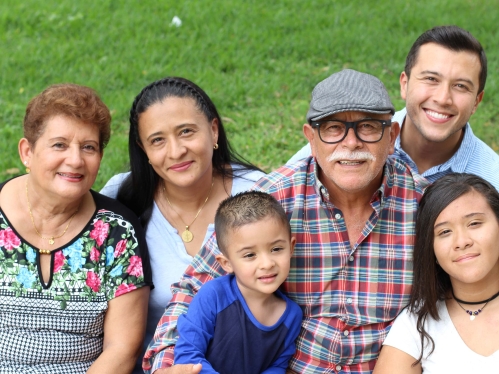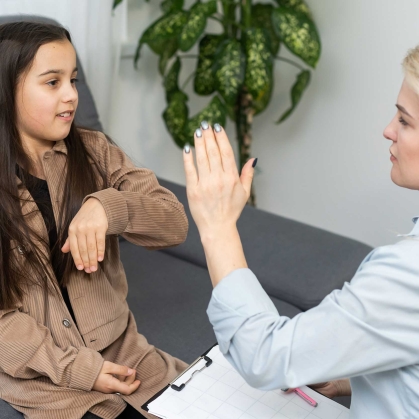
Research and Evaluation
The Center for Research on Ending Violence has successfully established itself as a leader in research. We receive national support from key funders and collaborate with numerous organizations locally and globally.
Our Focus
We are committed to producing innovative, multidisciplinary research, with an emphasis on evidence-based prevention and intervention strategies. The scope of our research varies from federally-funded projects to smaller local evaluations.
We partner with nonprofit, government, and corporate entities in all aspects of our community-based research projects. We have expertise in a number of topic areas related to violence against women and children, including knowledge of appropriate measures that can be utilized by your organization.
We have conducted community-based, statewide, and national research in:
- Bystander intervention
- Teen dating violence
- Economic empowerment and abuse
- Gender-based violence and abuse in schools
- Gender norms
- Impact of MSW education on violence against women and children
- Attitudes and beliefs of child welfare workers about domestic violence
- Evaluation of community programming around domestic violence and prevention
- Comprehensive assessment of child-welfare involved youth
- Examination of the strengths and challenges of community programs for at-risk youth
- Domestic minor sex trafficking

Recently Released Reports

Our team
Projects are led by:

Our Affiliates
Our affiliates researchers integrate a focus on interpersonal violence (as applicable) into their research projects.
Affiliates include:

Mentoring
REV is also committed to providing learning and mentoring opportunities for MSW and PhD level students. Graduate students work as research assistants in various projects and collaborate with faculty to pursue their own areas of interest.






Research Topic Areas
Utilize the accordion list below to view our current and completed projects sorted by topic area.
-
- Rutgers University-Wide Faculty and Staff Sexual Harassment Campus Climate Assessment, Academic and Workplace Behaviors Environment Survey
- Needs Assessment for Survivors of Domestic and Sexual Violence with Disabilities in New Jersey
- Enhancing Victim Services Throughout Rutgers University, Attorney General’s (AG), Victims of Crime Act (VOCA) Grant
-
- Needs Assessment for Survivors of Domestic and Sexual Violence with Disabilities in New Jersey
- A holistic community-based intervention for domestic violence in Quito, Ecuador
- Outcomes Associated with Arrest for Domestic Violence: A Systematic Review
-
- Just As I Am Youth Empowerment (JAIA) Evaluation
- Enhancing Victim Services Throughout Rutgers University, Attorney General’s (AG), Victims of Crime Act (VOCA) Grant
- Rutgers CARES
-
- Training and Technical Assistance: Professional Development Certificate Program
- Enhancing Victim Services Throughout Rutgers University, Attorney General’s (AG), Victims of Crime Act (VOCA) Grant
- Training and Technical Assistance: National Online Training Program (Virtual Academy)
- Training and Technical Assistance: Online
-
- Artists Mentoring Against Racism, Drugs, & Violence (AMARD&V) Evaluations
- Resilience Portfolio Consortium
- A holistic community-based intervention for domestic violence in Quito, Ecuador
- Building the Rutgers Gun Violence Care Center (RGVCC) in New Brunswick, NJ: A Multidisciplinary Approach to Health for Firearm Injury Survivors
- Outcomes Associated with Arrest for Domestic Violence: A Systematic Review
- Understanding Latina Experiences with Victimization, Intersectionality, and Discrimination (LAT-VIDA)
- Training and Technical Assistance: Professional Development Certificate Program
Research Project Type
Utilize the accordion list below to view our current and completed research projects sorted by project type.
-
- Artists Mentoring Against Racism, Drugs, & Violence (AMARD&V) Evaluations
- Just As I Am Youth Empowerment (JAIA) Evaluation
- Rutgers CARES
- Training and Technical Assistance: National Online Training Program (Virtual Academy)
- Training and Technical Assistance: Professional Development Certificate Program
- Training and Technical Assistance: Online
-
- Rutgers University-Wide Faculty and Staff Sexual Harassment Campus Climate Assessment, Academic and Workplace Behaviors Environment Survey
- Needs Assessment for Survivors of Domestic and Sexual Violence with Disabilities in New Jersey
- Enhancing Victim Services Throughout Rutgers University, Attorney General’s (AG), Victims of Crime Act (VOCA) Grant
- Understanding Latina Experiences with Victimization, Intersectionality, and Discrimination (LAT-VIDA)
-
- A holistic community-based intervention for domestic violence in Quito, Ecuador
- Building the Rutgers Gun Violence Care Center (RGVCC) in New Brunswick, NJ: A Multidisciplinary Approach to Health for Firearm Injury Survivors
-
- Just As I Am Youth Empowerment (JAIA) Evaluation
- Needs Assessment for Survivors of Domestic and Sexual Violence with Disabilities in New Jersey
- A holistic community-based intervention for domestic violence in Quito, Ecuador
-
- Rutgers University-Wide Faculty and Staff Sexual Harassment Campus Climate Assessment, Academic and Workplace Behaviors Environment Survey
- Understanding Latina Experiences with Victimization, Intersectionality, and Discrimination (LAT-VIDA)
-
- Outcomes Associated with Arrest for Domestic Violence: A Systematic Review)
Evaluating the Domestic Violence Liaison Program
Starting in July, 2015, the Center for Research on Ending Violence (REV) at Rutgers School of Social Work received funding from the New Jersey Department of Children and Families to evaluate the statewide Domestic Violence Liaison (DVL) program. The purpose of the project is to identify whether interagency collaboration between child welfare agencies and domestic violence service organizations can positively impact the lives of families experiencing co-occurring domestic violence and child maltreatment.
The research team at The REV Center reviewed academic literature and reports to learn how child welfare and domestic violence agencies across the U.S. have and are currently addressing the co-occurrence of domestic violence and child maltreatment as well as factors that either facilitate or hinder collaboration between systems. From this information, two research-to-practice briefs were developed outlining the best practices and policies on addressing domestic violence in child welfare systems. Both briefs were disseminated to the Department of Children and Families (DCF) and to the New Jersey Coalition to End Domestic Violence (NJCEDV) and can be viewed below.
- Research Brief I: An Overview of Systems Collaboration Efforts to Address the Co-occurrence of Domestic Violence and Child Maltreatment
- Research Brief II: Factors that Facilitate Successful Cross System Collaboration
REV facilitated eight focus groups with key stakeholders across the state of New Jersey, including CP&P staff, DVLs, and DVL supervisors. Focus groups discussed the current processes for screening and referring clients to the DVL program as well as the successes and challenges with the DVL program with specific attention given to determining successful collaboration and barriers to collaboration.
REV distributed a confidential online survey to every local CP&P office and domestic violence program in each county. The survey included questions on perceptions of and experiences with the DVL Program as well as their knowledge and attitudes around domestic violence, child maltreatment, and the intersection of the two. Additionally, questions were asked regarding staff’s confidence in their ability to identify domestic violence and refer to the DVL program. Over 1,000 CP&P and DV professionals total, from every county in NJ, participated in the survey.
The research team at VAWC recruited 200 women in three New Jersey counties to conduct interviews regarding their experiences with the DVL program and with the overlap of the child welfare and domestic violence systems. These interviews were conducted in order to assess the effect the DVL program has on outcomes for families impacted by domestic violence.

Assessing Domestic Violence under the Family Violence Option (FVO)
The goal of this project is to create and validate a risk assessment tool to be used with domestic violence victims receiving Temporary Assistance for Needy Families (TANF) services. The specific objectives of this research are: 1) Report on the best practices and policies on how domestic violence is identified and how risk is assessed by other welfare departments across the U.S.; 2) Determine current practices on assessing risk of domestic violence with clients receiving welfare services in New Jersey; and 3) Create, implement, pilot, and train on a new risk assessment tool to be used with welfare clients experiencing domestic violence. The research team is in the process of finalizing the risk assessment tool and the final report for the project.
- Phase I Report IA - Assessing Domestic Violence under the Family Violence Option: Detailed Review of State FVO Practices
- Phase III Report - Assessing Domestic Violence under the Family Violence Option: Risk Assessment Tool Creation
Tool Creation
The “New Jersey Assessment of Domestic Violence Risk and Impact (NJADVRI)” assessment tool was developed as part of the “Assessing Domestic Violence under the Family Violence” research project conducted by the Center for Research on Ending Violence (REV) and funded by the New Jersey Department of Family Development. The goal of this project was to create, test, and validate a risk assessment tool (August 2017) for domestic violence victims applying for services and waivers under the Family Violence Option as part of seeking TANF support. The Phase III Report outlines the process that was used to develop and test the risk assessment tool. If you are interested in utilizing the tool, we encourage you to review the final report for additional information.

Welcome to the webpage of the Community Action and Mattering Initiative (CAMI)! On this page, you can learn more about the goals of this project and receive updates on what we are learning from youth and adults across New Hampshire.
The overall goal of this research study is to learn more about how communities work together to solve problems like domestic violence and sexual assault and to help their towns be healthier places for everyone in the community.
The best way to understand communities is by listening carefully to the voices of those who live in them through various conversations. We hope to learn from town residents in a number of ways: by interviewing individuals in towns, by offering citizens the chance to meet in groups to talk about their ideas, and by surveying youth and adults about their opinions and experiences.
The research is being conducted by Professor Vicki Banyard and Professor Katie Edwards. You can learn more about the project by contacting Professor Banyard.
Click the report names below to download the reports.
- Community Conversations on Relationship Violence: Town Variations in Prevention Perceptions
- Results from the Community Action and Mattering Initiative: Can Changing Norms Using Green Dot Community Help Reduce Sexual Violence Among Adolescents?
- The Community Action and Mattering Initiative: Input from Adult Participants
This project is funded by the Centers for Disease Control and Prevention.
If you would like to speak with someone about domestic violence or sexual assault, you can contact your local crisis center.
Here are some national organizations where you can learn more about the topics:
Rape, Abuse and Incest National Network (RAINN)
1-800-656-HOPE (4673)
https://rainn.org/
National Domestic Violence Hotline
1-800-799-SAFE (7233)
http://www.thehotline.org/
The information presented on this webpage is solely the responsibility of the authors and does not necessarily represent the official views of the Centers for Disease Control and Prevention or the Department of Health and Human Services.

Testing & Validating Financial Measures with IPV Survivors
Overview
This project builds on a previous study conducted by The Center for Research on Ending Violence, “The Economic Empowerment of Survivors” which evaluated the impact of a financial education curriculum, the Moving Ahead Through Financial Management curriculum, on survivors’ economic outcomes. Results showed that intimate partner violence (IPV) survivors in the experimental group had significantly higher scores in financial attitudes, financial literacy, economic self-efficacy, economic self-sufficiency, financial intentions, and financial behaviors than those in the control group, and these positive changes remained over time.
The current project, Testing and Validating Financial Measures with IPV Survivors, used the data collected from the previous study and conducted further analyses to learn about the English and Spanish language scales used. The overall purpose of this project was first to analyze the measures used in the economic empowerment study (Phase I) and then validate the scales related to the financial experiences of women who have experienced IPV with a new sample of both English and Spanish-speaking IPV survivors (Phase II).
During Phase I, between June 2018 and September 2018, the original data from the evaluation of the Moving Ahead Through Financial Management was re-analyzed by separately examining the Spanish and English samples, and the financial scales were revised and finalized in English and Spanish. During Phase II, between November 2018 and January 2020, 425 women were recruited from seven agencies in New York, New Jersey, and Puerto Rico. Individual interviews were used to administer a questionnaire with the nine financial and abuse scales. Of the final sample, eight participants were removed due to missing data, duplication, or experience of violence other than IPV, resulting in a final analytical sample of 417 women, of which 209 completed the questionnaire in English and 208 completed the questionnaire in Spanish.
The results of this study indicate that the nine scales are appropriate tools to assess the economic empowerment and abusive experiences of IPV survivors whose primary language is English or Spanish. This study provides evidence of construct validity of the scales in both languages. Although further research is needed to test the measurement equivalence of four of the scales (Scale of Economic Self-Sufficiency, Financial Management Attitudes Scale, and the Scales of Financial Behaviors and Intentions), results demonstrated that language differences do not bias the Financial Knowledge Scale, Scale of Economic Self-Efficacy, Financial Strain Survey – R, Abusive Behavior Inventory – R2, and Scale of Economic Abuse – 12.

Predatory Alienation
The objective of the project, “Evaluating the State of Predatory Alienation in New Jersey,” was to identify the nature of predatory alienation and its effects on young adults and older adults. The Department of Children and Families and the Department of Human Services contracted the Center for Research on Ending Violence (REV) at the Rutgers School of Social Work to study this issue. Principal Investigator, Dr. Jacquelynn Duron and Co-Investgator, Dr. Judy Postmus worked with staff to tackle this relatively new concept.
In 2012, several individuals in New Jersey began a nonprofit organization, NJ Safe & Sound, to advocate for legislation to protect families in cases of undue influence and predatory alienation. Their own personal experiences with predatory alienation led them to their advocacy efforts.
As a result of the advocacy efforts of NJ Safe and Sound, Senate Bill 25621 and Assembly Bill 4244 were passed and signed by the Governor (P.L. 2017, Chapter 64) , requiring the Department of Children and Families (DCF) and the Department of Human Services (DHS) to conduct a joint study and make recommendations concerning predatory alienation. The Act defines predatory alienation as “ extreme undue influence on, or coercive persuasion or psychologically damaging manipulation of another person that results in physical or emotional harm or the loss of financial assets, disrupt s a parent - child relationship, leads to a deceptive or exploitative relationship, or isolates the person from family and friends. ” With this definition in mind, researchers at The REV Center sought to answer the following questions:
- How do online predators, human traffickers, con artists, gangs, cults, and other groups use predatory alienation to isolate young adults and senior citizens from their family and friends?
- What are the grooming practices used to target and control young adults and older adults?
- What are the high - pressure tactics used in scams and exploitative relationships to manipulate, control, and take advantage of older adults?
- Why are young adults and older adults particularly vulnerable to predatory alienation?
- What can young adults and older adults do to protect themselves from predatory alienation?
VAWC used a two-phased approach to gain a better understanding of predatory alienation and how it affects young adults and older adults, including a comprehensive literature review and key stakeholder interviews.

Providing Services to Trafficking Victims: Understanding Practices Across the Globe
Safe Horizon, a victim assistance agency serving the New York City area, is developing and convening a Global Learning Collaborative of human trafficking providers in order to explore best practice approaches when working with victims of human trafficking. As a first step before convening such a group, it was crucial to hear the voices of service providers around the world and to document those voices in a summary of findings. This summary will serve as a foundation for Safe Horizon to then gather service providers for the Global Learning Collaborative.
Through funding by Philip Morris International (PMI), Safe Horizon contracted the Center on Violence Against Women & Children (VAWC) at Rutgers University’s School of Social Work to interview providers working with victims of human trafficking across the globe. Safe Horizon chose to work with VAWC to engage an international network of human trafficking service providers in order to explore practice approaches for this project, Providing Services to Trafficking Victims: Understanding Practices Across the Globe.
This research was completed in two concurrent project phases. The goal of Phase One was to complete a comprehensive literature review on best practices and policies related to services for human trafficking victims across the globe. Publications and research studies found in the academic literature as well as online reports were reviewed by the research team. This information was used to inform the data methods used in Phase Two and to provide background information for Safe Horizon in preparation for the Global Learning Collaborative.
The goal of Phase Two was to collect detailed information from at least thirty providers from twenty countries to learn about and summarize their practice approaches when working with human trafficking victims. This was accomplished by:
- Identifying the 30 providers from at least 20 countries to participate in interviews for the project
- Interviewing the identified providers about their work with human trafficking victims; and
- Analyzing the data collected.
For more information, please refer to the Research to Practice Brief or to the Final Report. This report summarizes findings from this project and includes a literature review, as well as study methods and results from the interviews. The report concludes with a series of recommendations based on these findings.

Economic Empowerment of Survivors
This project builds upon the previous evaluation conducted by the Center for Research on Ending Violence (REV) at Rutgers University, School of Social Work to accomplish a multi-year experimental, longitudinal design to determine the impact of the Moving Ahead through Financial Management curriculum with survivors of violence. Survivors were assigned to either an experimental group (receiving advocacy services and the curriculum during group and individual sessions) or a control group (receiving advocacy services only). All survivors, recruited on an ongoing basis from 14 domestic violence organizations from 7 states and Puerto Rico, were interviewed four times over a 14 month period.
For more information about this project:
This project was supported by The Allstate Foundation, Economics Against Abuse Program. Points of view in this document are those of the authors and do not necessarily represent the official position or policies of The Allstate Foundation.








Exploratory Project on Domestically Trafficked Adolescents in New Jersey
The Department of Children and Families has contracted with Drs. Judy Postmus and Cassandra Simmel to conduct an exploratory study to learn about best practices for serving domestically trafficked adolescents in the State of New Jersey.
Research briefs
- Our first research brief focuses on "Identification and Assessment of Domestic Minor Sex Trafficking (DMST)"
- Our second research brief focuses on "From Research to Practice: Secondary Trauma & Domestic Minor Sex Trafficking (DMST)"
- Our third research brief focuses on "From Research to Practice: Interventions for Youth Involved in Domestic Minor Sex Trafficking"
The Final Report and Executive Summary can now also be accessed below:

SCREAM-ing to Prevent Violence Overview
In 2010, Drs. Sarah McMahon (PI) and Judy L. Postmus (Co-PI) at the Center for Research on Ending Violence (REV) at Rutgers University, School of Social Work received funding from the Centers for Disease Control and Prevention (CDC) to conduct an extensive evaluation of the effectiveness of the SCREAMing to Prevent Violence curriculum. The SCREAM program is a peer education program that uses theater to addresses attitudes and behaviors related to campus sexual assault and encourages prosocial bystander intervention.
- To read an executive summary of research findings, click here.
- To listen to a podcast of an interview with Dr. Sarah McMahon conducted by PreventConnect about the research findings, click here.
Based on the research findings, a manual was also developed to guide university and college administrators when considering using peer education and specifically the SCREAM program to prevent violence on their campuses. This manual provides an overview of the SCREAMing to Prevent Violence (STPV) © curriculum developed by Rutgers Office for Violence Prevention and Victim Assistance (VPVA).
- Download the complete manual.
- SCREAM Theater©, SCREAM Athletes©, and SCREAMing to Prevent Violence© were created by staff from the VPVA and can be purchased for a reasonable fee. For more information about the full curricula along with detailed support to implement these programs on your campus, please contact VPVA. Any questions about this study should be directed to revcenter@ssw.rutgers.edu
This research was supported by a grant from the Centers for Disease Control and Prevention (CDC) to the Center for Research on Ending Violence at Rutgers University, School of Social Work (grant number: 5R01CE001855-03). Its contents are solely the responsibility of the authors and do not necessarily represent the official views of the CDC.
Teen Dating Violence Fact Sheets
Teen dating violence is a highly prevalent issue. According to the Centers for Disease Control and Prevention (CDC), one in four adolescents reports verbal, physical, emotional, or sexual abuse from a dating partner.
To change this statistic, in 2011, it became a NJ state law requirement for all NJ school districts to instate dating violence education in the health curriculum. To enforce compliance with this law, the NJ Domestic Violence Fatality and Near Fatality Review Board, along with a number of leading agencies in NJ, has endorsed a series of fact sheets on teen dating violence to guide administrators and educators in the implementation of dating violence education programs.
The Center for Research on Ending Violence in collaboration with the NJ Domestic Violence Fatality and Near Fatality Review Board have compiled Teen Dating Violence Factsheets for Educators and Community members.
View Fact Sheets
- What is Teen Dating Violence?
- What is the impact of Teen Dating Violence?
- Teen Dating Violence Statistics
- Bullying vs Teen Dating Violence
- Responding to Teen Dating Violence for Educators
- Creating Safe Communities Free of Teen Dating Violence
- Teen Dating Violence Resources
- Complete Teen Dating Violence Fact Sheets



Legislation
Legislation (P.L. 2011, Chapter 64) (N.J.S.A. 18A:35-4.23a, 18A:37-33 et.al) enacted on May 4, 2011 requires each school district/charter school to approve a policy to prevent, respond, and educate their students, as well as their school community on incidents of dating violence. A safe and civil school environment is necessary for students to learn and achieve high academic standards. A student who is a victim of dating violence suffers academically and the student’s safety at school is jeopardized.



